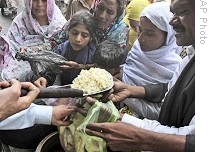VOA标准英语10月-UN Food Agency Worries About Contributions(在线收听)
 |
| Pakistani people receive donated food in a food distribution center on eve of the World Food Day in Lahore, Pakistan, 15 Oct. 2008 |
The United Nations food agency based in Rome, the Food and Agriculture Organization, is concerned that the number of hungry people in the world, estimated at 923 million in 2007, will further increase in 2008.
Marking World Food Day, FAO Director General Jacques Diouf warned that the global financial crisis was likely to lead governments to rethink their development aid commitments in favor of hungry people. He has urged governments not to drop aid or restrict trade as this may further the plight of the world's hungry and poor.
"If there is a recession, naturally it will be more difficult to mobilize the resources for agriculture in developing countries but also the income of people will not increase in a period of recession and therefore we may have more poor people and more hungry people," he said.
At a ceremony at FAO on Thursday, Diouf said that the food organization knows what has to be done to eradicate hunger for 923 million people and he said it also knows what needs to be done to double food production for a world population expected to rise to nine billion by the year 2050.
The director general noted that $22 billion (US) was pledged to promote global food security earlier this year, but that only 10 percent of this has so far materialized. He said what is needed is political will and delivery on financial commitments by members states.
Pope Benedict, in a message read at the ceremony, said that a lasting solution to hunger in the world lay in the promotion of an international order based on social justice. He said that the world produces enough food to feed a growing population. If people go hungry, it is partly because of a "race for consumption" which "imposes forced reductions on the nutritional capacity of the world's poorest regions."
He said other reasons include lack of political will by nations but also "runaway speculation", together with "corruption in public life or again growing investments in weapons and sophisticated military technologies to the detriment of people's primary needs."
This year's World Food Day activities, which involve over 150 countries, are focused on climate change and bio-energy.